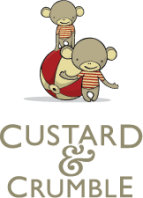Top tips to keep your baby as safe as possible
One of the biggest stresses of any new parent is keeping your baby safe, what should or shouldn’t you do and what advice to listen to or ignore. With so much information out there Custard & Crumble are thrilled to have Emma Hammett, CEO of First Aid For Life, giving us all the information you need about keeping your baby as safe as possible.
Babies do not come with instructions. They are all different and bring unique challenges. Hormones and sleep deprivation combined with parental exhaustion and the responsibility of a tiny new baby can be totally overwhelming, particularly for first-time parents. With a new baby comes an irrepressible need to protect them and make them happy. You’ll be overwhelmed by scare stories, conflicting information, advice and an endless list of do’s and don’ts! Fortunately, young babies are fairly well-designed and don’t get up to too many dangerous exploits, so the risk of accident is relatively low. Most young babies admitted to hospital have either respiratory infections or have had an accidental fall, usually whilst being carried to or from bed.
New born baby characteristics:
- A large head in relation to body size, which makes them head-heavy.
- A soft-spot or fontanel on top of their head– this will fuse together in the first 10–18 months
- Very thin, sensitive skin – 15 times thinner than an adult’s
- Bendy bones and a flexible rib cage
- Very little control over their own movement
- A strong grasp reflex
- Can kick, wriggle and wave their arms
3 months
- Babies may be able to roll over independently from front to back, or back to front
- Grabbing things
- Put things in their mouths
6 months
- Many babies can sit up unsupported
- Push and pull things and roll to get to things
- Many babies begin to crawl or move in some other way independently
Most common accidents
- Falls from raised surfaces, baby bouncers, high chairs and down stairs.
- Suffocation from bed covers, in baby slings, from nappy sacks.
- Choking on food or small objects.
- Strangulation from ribbons, blind cords, drawstring bags hung over the cot.
- Poisoning from carbon monoxide.
- Burns and scalds from hot drinks, bath water, sunburn.
- Drowning – babies can drown in a couple of centimeters of water.
Safety advice for babies Never leave babies unattended on a raised surface or in the bath, not even for a second. Nappies are best changed on the floor as there are so many cases of babies who have rolled off the changing table in the split second their parent has reached for something
- Never place bouncy chairs or car seats on a raised surface.
- Always strap your babies into highchairs and buggies.
- Ensure you hold onto the banister when carrying your baby downstairs.
- Fit safety gates to your stairs before your baby starts crawling.
- Do not use duvets and pillows with babies under 12 months.
- Babies should sleep on their back in the feet to foot position.
- Keep nappy sacks and small objects well away from babies – if they grab them they can easily suffocate as they don’t have the dexterity to remove them from their faces.
- Keep pets away from small babies.
- Don’t leave toddlers and other young children alone with your baby.
- Never hang drawstring bags on cots, avoid cot bumpers which tie around the cot and use blind cord clips or alternatively choose a cordless blind.
- Fit a carbon monoxide alarm and have appliances regularly serviced.
- Don’t drink hot drinks whilst holding a baby, and never pass hot drinks over a baby’s head.
- Be careful of microwave hot spots when heating bottles and food – always shake or sir thoroughly and test the temperature before feeding the baby.
- Fill a bath with cold water first and use a bath thermometer as well as checking the temperature yourself before bathing the baby.
- Never place a cot by a radiator.
- Use strong factor baby sun cream in the summer.
- Keep babies in the shade, wear UV protective clothing and hats, and avoid midday sun.
It is strongly advised that you attend a Practical or online First Aid course to understand what to do in a medical emergency. Please visit www.firstaidforlife.org.uk emma@firstaidforlife.org.uk or Tel 0208 675 4036 for more information about our courses.
First Aid for life provides this information for guidance and it is not in any way a substitute for medical advice. First Aid for Life is not responsible or liable for any diagnosis made, or actions taken based on this information.
Emma Hammett, First Aid for Life Tel: 0208 675 4036. www.firstaidforlife.org.uk
First Aid for Life is an award winning First Aid training business that is HSE and Ofqual Approved through Qualsafe Awards. Our trainers are medical and emergency services professionals and our training is tailored to your needs.
